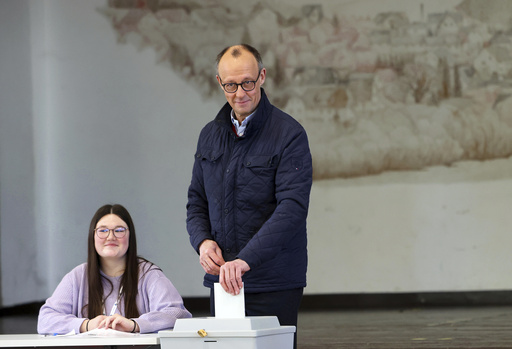
German citizens are set to vote in a national election on Sunday, where the current chancellor is up against the leader of the opposition, the vice chancellor, and, for the first time, a representative from a far-right party.
Germany’s electoral framework rarely allows any party to achieve a majority, with polls indicating that none are close to that goal this time around. It is anticipated that a coalition comprising two or more parties will be necessary to form a new government in the coming weeks.
This election arises during a complex period for Germany and Europe in general, contending with the newly established Trump administration, the ongoing Russia-Ukraine conflict, and broader security issues on the continent.
Here’s an update on the current situation: over 500,000 new German citizens have the right to vote, with nearly one-third originally hailing from Syria. Many of these individuals fled their home country within the last ten years due to war, unrest, and economic struggles. During the peak migration years of 2015-2016, more than 1 million people from nations such as Syria, Afghanistan, and Iraq arrived in Germany.
Since the last national election held in 2021, the number of naturalized citizens has significantly increased. For those new Germans with Syrian roots, this election carries particular weight. Many escaped their homeland due to the civil war ignited by former President Bashar Assad’s violent response to pro-democracy protests. Assad was ousted in November, yet the path to democracy for Syria remains ambiguous. Fortunately, these individuals now have the opportunity to participate in elections in their new country.
When it comes to forming a new government, there are no formal processes in place, nor is there a set timeline. Conservative leader Friedrich Merz, who is currently leading in the polls, expressed hope to establish a new government by mid-April should he secure victory. Until a new chancellor is appointed, Chancellor Olaf Scholz’s current administration will function in a caretaker capacity.
Mainstream political parties in Germany have traditionally maintained a stance against collaborating with any far-right factions that pose a threat to democracy—a position commonly referred to as a “firewall.” This includes the Alternative for Germany (AfD) party participating in Sunday’s election. Recently, U.S. Vice President JD Vance faced backlash from German officials after stating that there should be no “firewalls” in politics.
The AfD first made its entrance into the parliamentary system eight years ago, propelled by public dissatisfaction with the influx of migrants in the mid-2010s, and the party’s primary agenda remains focused on limiting immigration. However, they have adeptly capitalized on other societal grievances related to Germany’s energy transition, COVID-19 restrictions, and support for Ukraine in light of the Russian invasion nearly three years ago.
Uli Hoeness, an influential figure in Bayern Munich, recently voiced his intent to engage with any club players who express support for the AfD. Hoeness, now an honorary president after four decades of involvement with the club, said in an interview that he would question any players who align with the far-right party and assess their mental readiness. He has previously urged ongoing club initiatives aimed at combating racism and promoting inclusion, highlighting Bayern as a positive example of multicultural integration.
The direction of Germany’s next government holds significant implications for Europe as a whole concerning its response to U.S. President Donald Trump’s assertive policies. Chancellor Olaf Scholz remarked that the prospect of a second Trump presidency would pose challenges for Germany. AfD leader Alice Weidel has taken a page from Trump’s rhetoric, aiming to “make Germany great again.”
In the weeks leading up to the election, there have been massive protests against Merz and the AfD’s influence. Many demonstrators and former Chancellor Angela Merkel criticized Merz for allegedly breaching the established “firewall” against cooperation with extremist parties. Merz has maintained that his stance remains unchanged, insisting he will not ally with the far-right party.
Friedrich Merz has cast his vote in the election, affirming his position as the leader of the center-right Union bloc, which holds a favorable chance of securing government formation. He voted in Arnsberg in western Germany shortly after Chancellor Olaf Scholz, who is currently experiencing a political setback due to the collapse of his previous coalition government. Merz is competing against candidates including environmentalist Greens leader Robert Habeck and far-right figure Alice Weidel.
The election has drawn participation from numerous voters, with German citizens aged 18 and older eligible to cast ballots. Approximately 59.2 million citizens in a population of 84 million are expected to take part, with about 2.3 million voting for the first time. Polling places are open from 8 a.m. to 6 p.m., with exit polls and official results anticipated to emerge shortly after the polls close, with a finalized count expected on Monday.
The candidates vying for the chancellorship include the incumbent Olaf Scholz, opposition chief Friedrich Merz, Vice Chancellor Robert Habeck, and AfD co-leader Alice Weidel. Polls officially opened throughout Germany, a pivotal moment given the potential impacts of this election for Europe’s political landscape, especially in relation to the challenges it faces in light of the new Trump administration and the Russia-Ukraine conflict.
This polling event arises seven months earlier than anticipated, following the dismantling of Chancellor Scholz’s coalition in November, marking only the fourth instance of an early dissolution of the Bundestag in post-war Germany due to loss of confidence.

